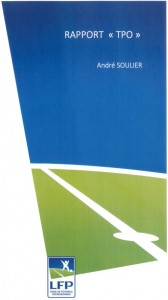The concept of Third Party Ownership in the international professional football industry (continued)
 As announced in our December 2014 e-newsletter, following FIFA’s decision to ban Third-Party Ownership (“TPO”) arrangements worldwide, the French Professional Football League (“LFP”) had decided to launch a fact-finding mission with the League 1 and League 2 professional clubs, as well as participants in TPO arrangements, the players’ union, and sports agents who have already dealt with this type of arrangements.
As announced in our December 2014 e-newsletter, following FIFA’s decision to ban Third-Party Ownership (“TPO”) arrangements worldwide, the French Professional Football League (“LFP”) had decided to launch a fact-finding mission with the League 1 and League 2 professional clubs, as well as participants in TPO arrangements, the players’ union, and sports agents who have already dealt with this type of arrangements.
As Chair of the Legal Affairs Commission of the LFP, I filed in late April my report on the hearings conducted on this issue, a report that also contains recommendations for the future.
The full excerpt of the findings of the report, consolidated under a Section entitled “Perspectives”, is reproduced below:
6. PERSPECTIVES
- The end of speculative TPO arrangements
Relying on the definition of TPO set forth in the introduction of this report, it is apparent that FIFA wished to put an end to “Recruitment TPO” (archetype of South American TPO) and “investment TPO” (e.g. Portuguese TPO), but does not close the door to a certain form of “financing TPO”.
In other words, the intervention of third parties is permitted only if their role is exclusively limited to a strictly banking activity (reimbursement of the loaned amount + interests, transfer of receivables, etc.).
FIFA’s will to put an end to speculative practices in the use of TPO, highly criticized today, is thus indisputable.
This means that funds such as Doyen Sports or Fair Play Capital – that had announced their desire to invest in France – would be deprived of the possibility to carry out their project on the long term as the very purpose of these structures is to guarantee to investors a significant share in the resale of the player in which they invested.
By doing so, FIFA appears to have tried to find a form of compromise between the imperative for clubs to have a total control over their players and the need for them to benefit from sources of financing available only to banks.
Event though the provisions adopted by FIFA with respect to TPO are, on the whole, a step towards sounder “third-parties’” practices, the new framework set up by FIFA is paradoxically a gateway for French clubs in that they would have the possibility, under the next text, to benefit from the support of investments funds, as regulated by FIFA.
- Transposition of Article 18 ter of FIFA’s regulation into LFP’s regulations
Pursuant to FIFA’s circular dated December 29, 2014, the provisions set forth in Articles 18 bis and 18 ter are part of the binding provisions that must be incorporated as such into national regulations.
In other words, the LFP must introduce in its regulations Article 18 ter that calls into question the outright prohibition provided for under Article 221 of LFP’s current regulations.
It remains unclear whether this transposition must be completed as early as for the 2015/2016 football season or once the various appeals lodged against the new provisions have been exhausted. The appeal proceedings that have been initiated are likely to be lengthy and their outcome will not be known before several years.
Said appeals do not, however, suspend the application of FIFA’ regulations on this major issue. We, therefore, believe that it is essential for the sake of loyalty and credibility of competitions and for the development of a sound and successful economic model within a globalized sport industry, to transpose without delay the provisions adopted by FIFA into the LFP’s regulations.
It will be up to the Board of Director of the LFP to determine that issue – on the basis of the opinion of the Regulation Review Commission – during its forthcoming meeting scheduled on June 11.
- TMS FIFA
As part of the monitoring process that FIFA wishes to implement during the transitional phase, clubs are required to enter into the TMS [FIFA’s Transfer Matching System for international player transfers] any and all agreements that qualify as TPO-related arrangements within the meaning of the new provisions adopted by FIFA.
This obligation must be met by April 30, 2015.
Consequently, French clubs that have granted to their players or agents an interest (in percentage) on a future transfer must download these amendments/contracts on the dedicated interface integrated into the TMS”.
 Strategic Lawyering
Strategic Lawyering 